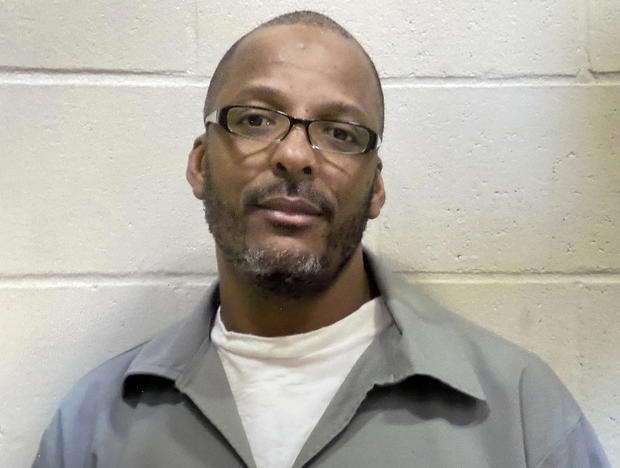A Missouri man has been in prison for 33 years. A new hearing could determine if he was wrongfully convicted.
A hearing this week will determine if Missouri inmate Christopher Dunn should go free after spending more than three decades in prison for a murder that he has always said he did not commit. Dunn's conviction and life sentence without parole hinged on the testimonies of two witnesses — a preteen and a young teenager — who have since admitted to lying during the trial.
St. Louis prosecutors are now convinced Dunn is telling the truth, but lawyers for the Missouri Attorney General's Office disagree and will argue for keeping him behind bars. Dunn, 52, is serving a sentence of life without parole at the state prison in Locking, Missouri, but is expected to attend the hearing before Judge Jason Sengheiser that begins Tuesday.
The hearing follows a motion filed in February by St. Louis Circuit Attorney Gabe Gore. A Missouri law adopted in 2021 allows prosecutors to request hearings in cases where they believe there is evidence of a wrongful conviction.
Dunn was convicted of first-degree murder in the death of 15-year-old Ricco Rogers in 1990, based largely on the testimony of two boys who said they witnessed the shooting. The state's eyewitnesses, ages 12 and 14 at the time, later recanted, claiming they were coerced by police and prosecutors.

"I couldn't tell you who Ricco Rogers was to save my life," Dunn told CBS News and "48 Hours" correspondent Erin Moriarty in a "CBS Mornings" segment last November. He introduced himself as "an innocent man who has been in prison for a crime which I didn't commit, who's afraid I might die in prison."
Dunn, who at that point had suffered three heart attacks while incarcerated, said he was "trying to figure out what justice is in Missouri."
Dunn has said that he was home with his mother when Rogers was killed. Despite the fact that there was no evidence to support the testimonies of those two teens who claimed they witnessed Rogers' murder, Dunn was convicted of the crime during a swift trial and has now been imprisoned for 33 years.
Moriarty attributed Dunn's ongoing incarceration to a quirk in Missouri law.
"If Dunn had been on death row, he'd be out by now. But he's serving life in prison without parole, which is kind of the same thing," Moriarty said. "But in Missouri, lifers aren't entitled to innocence claims, which leaves his fate in the hands of a prosecutor whose office put him behind bars in the first place."
Court filings show the two main witnesses in Dunn's trial recanted their testimonies, in sworn affidavits where each admitting to perjury, in 2005 and 2015, respectively. But Dunn remained in prison.
In May 2023, then-St. Louis Circuit Attorney Kim Gardner filed a motion to vacate Dunn's sentence. But Gardner resigned days later, and after his appointment by Gov. Mike Parson, Gore wanted to conduct his own investigation. Gore announced in February that he would seek to overturn the conviction.
Dunn, who is Black, was 18 when Rogers was shot to death on the night of May 18, 1990. No physical evidence linked Dunn to the crime but the two boys told police at the time that they saw Dunn standing in the gangway of the house next door, just minutes before shots rang out.
Rogers and the two boys ran when they heard the shots, but Roger was fatally struck, according to court records.
A judge has heard Dunn's innocence case before.
At an evidentiary hearing in 2020, Judge William Hickle agreed that a jury would likely find Dunn not guilty based on new evidence. But Hickle declined to exonerate Dunn, citing a 2016 Missouri Supreme Court ruling that only death row inmates — not those like Dunn sentenced to life in prison without the possibility of parole — could make a "freestanding" claim of actual innocence.
The 2021 law has resulted in the the release of two men who both spent decades in prison.
In 2021, Kevin Strickland was freed after more than 40 years behind bars for three killings in Kansas City after a judge ruled that he had been wrongfully convicted in 1979.
Last February, a St. Louis judge overturned the conviction of Lamar Johnson, who spent nearly 28 years in prison for a killing he always said he didn't commit. At a hearing in December 2022, another man testified that it was he — not Johnson — who joined a second man in the killing. A witness testified that police had "bullied" him into implicating Johnson. And Johnson's girlfriend at the time had testified that they were together that night.
A hearing date is still pending in another case in which a Missouri murder conviction is being challenged for a man who was nearly executed for the crime.
St. Louis County Prosecuting Attorney Wesley Bell filed a motion in January to vacate the conviction of Marcellus Williams, who narrowly escaped lethal injection seven years ago for the fatal stabbing of Lisha Gayle in 1998. Bell's motion said three experts have determined that Williams' DNA was not on the handle of the butcher knife used in the killing.
- In:
- Wrongful Convictions
- Missouri
- Incarceration
- Murder
- Crime
Disclaimer: The copyright of this article belongs to the original author. Reposting this article is solely for the purpose of information dissemination and does not constitute any investment advice. If there is any infringement, please contact us immediately. We will make corrections or deletions as necessary. Thank you.





